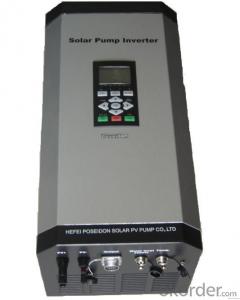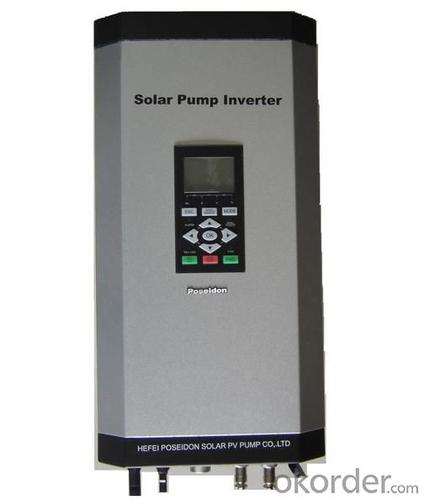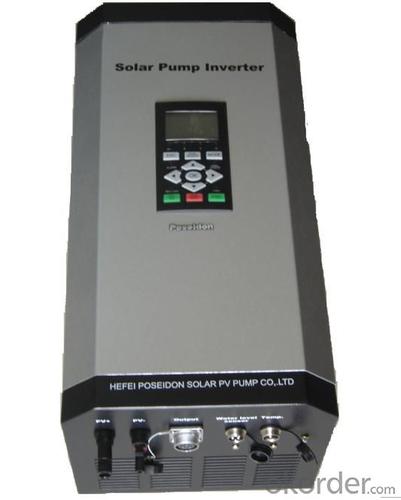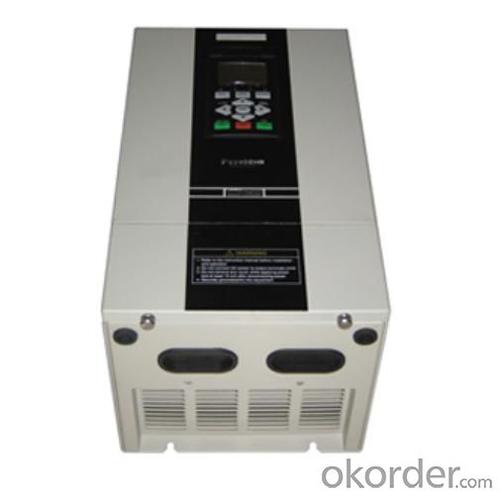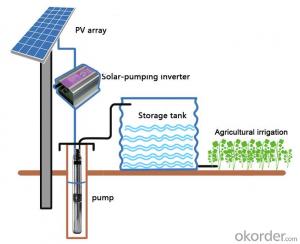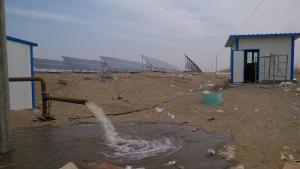RPS 800 Solar Pump FCPM4KWH Inverter
- Loading Port:
- China Main Port
- Payment Terms:
- TT OR LC
- Min Order Qty:
- -
- Supply Capability:
- -
OKorder Service Pledge
Quality Product, Order Online Tracking, Timely Delivery
OKorder Financial Service
Credit Rating, Credit Services, Credit Purchasing
You Might Also Like
Solar pump inverter FCPM4KWH Product Description:
Product Description:
Solar water pumping system is constructed with solar panel array,solar pump inverter and AC water pump, DC current produced from solar panel will be delivered to solar pump inverter,and it will convert it into AC current to drive water pump,and will automatically regulate output frequency according to sun radiance intensity,maximally realize MPPT tracking function.
Product Features
Adopting the proposed dynamic VI maximum power point tracking (MPPT) control method, with fast response, and reliable operation, achieves efficiency of 99%.
Designed with variable frequency driver, greatly improves efficiency
Extremely high efficiency
Digital mode control, with automatic operation and manual operation mode options
Complete protection functions
Adopts intelligent IPM module, with high reliability
LCD display and operation panel, in real time presents operating data
Optional for water level measurement and control circuit
Applicable for general ACC pumps, like centrifugal pump, piston pump etc.
Independent intellectual property; Highly effective, the redundant reliability, exempts the maintenance and the long life.
The pumps are soft started, fully protected.
No batteries are used. So better Sunlight, more water
Datasheet.
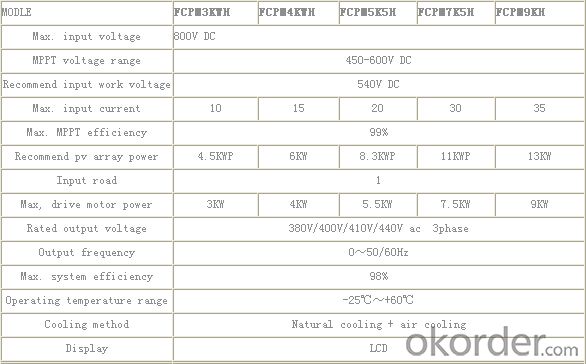
- Q: Can a solar pump be used for water supply in schools or community centers?
- Certainly, a solar pump can be utilized for water supply in schools or community centers. Solar pumps offer a dependable and sustainable solution for water supply by utilizing solar energy to extract water from wells, rivers, or other sources. They prove particularly suitable for areas with limited electricity access or an unreliable power grid. Installation, operation, and maintenance of solar pumps are effortless. They function without the need for fuel or electricity, which makes them both cost-effective and environmentally friendly. This quality also enables their usage in remote areas without access to grid electricity. Within schools or community centers, solar pumps can be employed to ensure a consistent water supply for various purposes, including drinking, sanitation, and irrigation. By pumping water into storage tanks, they guarantee a continuous and hygienic water supply for the community. Moreover, solar pumps can be integrated with other water treatment systems, for instance, filtration or purification units, to guarantee the safety of the supplied water for consumption. This renders them an ideal solution for addressing water scarcity and enhancing access to clean water in schools and community centers.
- Q: Are there any government incentives for using solar pumps?
- Yes, there are government incentives available for using solar pumps. These incentives vary by country and region but often include tax credits, grants, and subsidies to encourage the adoption of renewable energy technologies. These incentives aim to promote the use of solar pumps as a sustainable and environmentally friendly alternative to conventional pumps, ultimately helping to reduce energy costs and carbon emissions.
- Q: Are there any limitations to the depth of water a solar pump can lift?
- Yes, there are limitations to the depth of water a solar pump can lift. The maximum depth a solar pump can lift water depends on various factors such as the power and efficiency of the solar panels, the size and capacity of the pump, and the distance between the pump and the water source. Generally, most solar pumps are designed to lift water from depths ranging from 20 to 200 feet. However, as the depth increases, the amount of power required to lift the water also increases. Solar panels have a limited capacity to generate power, especially in low-light conditions or during cloudy days, which can impact the pump's performance. Additionally, the efficiency of the pump itself can decrease as the depth increases, as it has to work harder against gravity to lift the water. For extremely deep water sources, it may be necessary to use specialized solar pumps or combine solar power with other energy sources such as batteries or generators to overcome the limitations. It is important to consult with a professional or manufacturer to determine the appropriate solar pump for specific depth requirements.
- Q: Can a solar pump be used in hydroponic systems?
- Yes, a solar pump can be used in hydroponic systems. Solar pumps are an efficient and sustainable option for providing water circulation and nutrient delivery in hydroponics. They rely on solar energy to power the pump, making them an environmentally-friendly choice for growers.
- Q: How much sunlight is needed to operate a solar pump?
- The operation of a solar pump relies on several factors, including the size and efficiency of the pump, the capacity of the solar panels, and the location. The amount of sunlight needed for optimal functioning varies. Generally, solar pumps need a minimum amount of sunlight to function well. The most efficient pumps can work with only 2-3 hours of direct sunlight daily. However, for better performance, it is recommended to expose them to sunlight for longer periods. Ideally, solar pumps should receive 5-6 hours or more of full sunlight to generate sufficient power for their pumping needs. Weather conditions are crucial to consider as well. Cloudy or overcast days can significantly reduce the amount of sunlight reaching the solar panels, affecting the pump's performance. In regions with limited sunlight, it is advisable to install additional solar panels or use a battery backup system to ensure a continuous power supply for the pump. It is worth noting that solar pumps can also function with indirect or diffused sunlight, albeit with decreased efficiency. Therefore, even on partially cloudy days, solar pumps can still operate, although their output will be reduced. To determine the specific sunlight requirements for a particular solar pump, it is recommended to consult the manufacturer's specifications or seek advice from a solar energy professional who can assess the local conditions and provide accurate guidance.
- Q: What is the role of batteries in a solar pump system?
- The role of batteries in a solar pump system is to store the excess energy generated by the solar panels during the day and provide power to the pump during non-sunlight hours or when there is insufficient sunlight. This allows for the continuous operation of the pump, ensuring a reliable water supply even when solar energy is not available.
- Q: Can a solar pump be used for rainwater harvesting or stormwater management?
- Certainly! Solar pumps have the ability to be utilized for rainwater harvesting as well as stormwater management. By harnessing the power of solar energy, these pumps offer an eco-friendly and cost-efficient solution for the pumping and control of water. They possess the capability to gather rainwater in storage tanks or reservoirs, enabling its usage in a variety of applications such as irrigation, domestic consumption, or the replenishment of groundwater. Furthermore, solar pumps can play a vital role in stormwater management by either removing excessive stormwater from flood-prone areas or diverting it towards infiltration systems to prevent erosion and runoff. The utilization of solar pumps in rainwater harvesting and stormwater management contributes to the conservation of water resources and reduces reliance on traditional energy sources.
- Q: How does a solar pump handle water source contamination from textile manufacturing?
- A solar pump does not specifically handle water source contamination from textile manufacturing. However, it can be used to extract water from contaminated sources and channel it through a filtration system to remove impurities before its usage.
- Q: Are solar pumps suitable for use in industrial applications?
- Yes, solar pumps are suitable for use in industrial applications. They offer a reliable and cost-effective solution for pumping water or other fluids in various industrial processes. Solar pumps are powered by renewable energy, reducing dependence on fossil fuels and minimizing operational costs. They can be used in remote locations without access to electricity grids, making them highly versatile for industrial applications worldwide. Additionally, solar pumps are environmentally friendly and have low maintenance requirements, making them a sustainable choice for industrial operations.
- Q: Can a solar pump be used for water supply in sugarcane fields?
- Yes, a solar pump can be used for water supply in sugarcane fields. Solar pumps are capable of drawing water from a source, such as a well or a water body, and delivering it to the desired location. This makes them a sustainable and cost-effective solution for irrigating sugarcane fields, as they operate on clean and renewable energy. Additionally, solar pumps can be easily installed and require minimal maintenance, making them an ideal choice for remote or off-grid agricultural areas like sugarcane fields.
Send your message to us
RPS 800 Solar Pump FCPM4KWH Inverter
- Loading Port:
- China Main Port
- Payment Terms:
- TT OR LC
- Min Order Qty:
- -
- Supply Capability:
- -
OKorder Service Pledge
Quality Product, Order Online Tracking, Timely Delivery
OKorder Financial Service
Credit Rating, Credit Services, Credit Purchasing
Similar products
Hot products
Hot Searches
Related keywords

